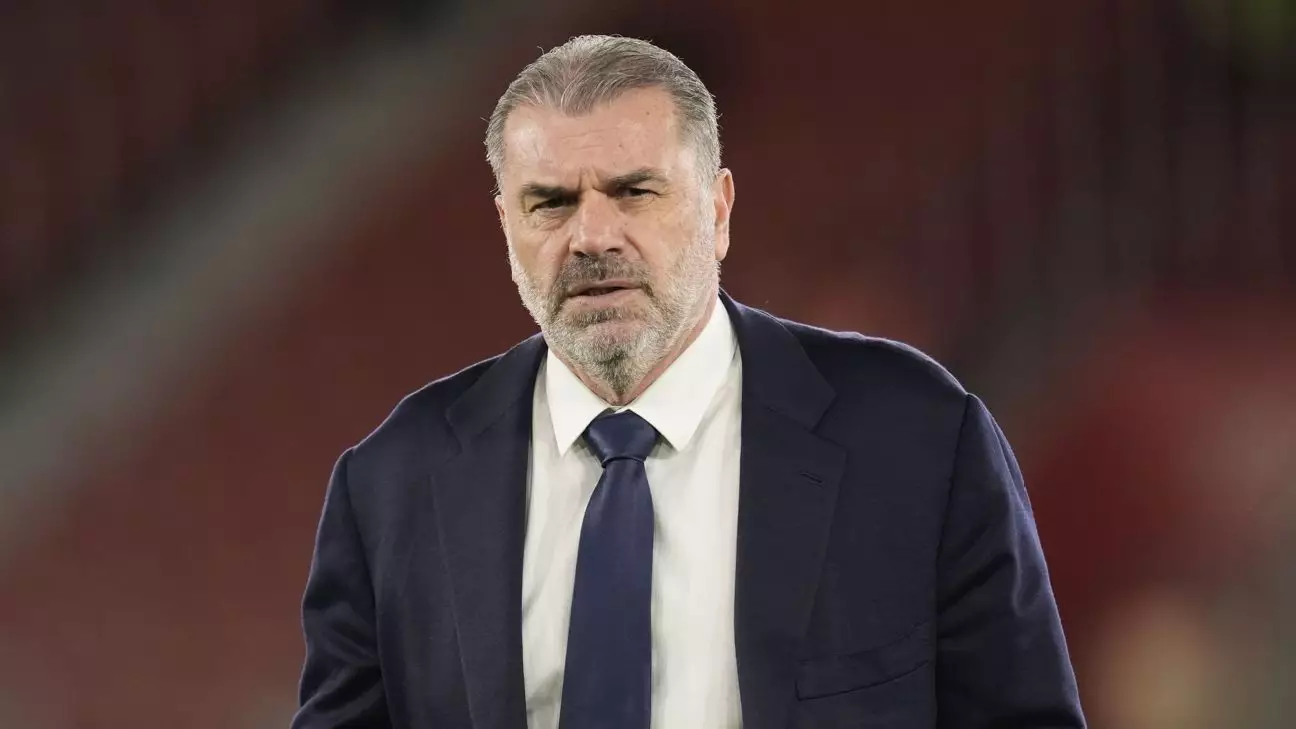When vying for success in the elite world of football, managers shoulder a monumental burden of expectations. Ange Postecoglou, who took the helm at Tottenham Hotspur last summer, soon found himself navigating treacherous waters filled with judgment and scrutiny. Despite his efforts to instill an attacking philosophy at the club, the results have been mixed at best, resulting in mounting criticism from the footballing community. Currently, sitting in 10th place in the Premier League, the team has won only two of its last seven matches, indicating a potential crisis in confidence and performance.
What amplifies Postecoglou’s struggle is not just the lack of shiny trophies to showcase but also the nature of his media commentary and public perception. His approach, often characterized as unyieldingly aggressive, has raised eyebrows among pundits and former players alike, stirring debate over whether such tactics are suitable for the club’s current dynamics. Indeed, a robust attacking game can be thrilling to watch, yet it requires a balance that can elude even seasoned managers.
The Accents of Criticism: Cultural Perceptions at Play
Postecoglou’s Australian background has entered the fray of the criticism he faces, leading him to suggest that some critiques may be tinged with an unconscious bias related to his accent. In a sport filled with traditionalists, the unique cultural perspective that he brings to the English Premier League can be misunderstood or even ridiculed. While he welcomes feedback—especially from media figures like Jamie Carragher—Postecoglou has labeled certain remarks as “offensive.” This points to a deeper conversation surrounding cultural sensitivities in sports.
Criticism in football can often morph into a personal affront, overshadowing the tactical discussions meant to improve teams. For Postecoglou, the labels he has received seem not only impactful in the context of performance but also as reflections of broader societal attitudes towards non-native figures in football. He has expressed concern that some opinions may stem from sensationalism rather than constructive dialogue, highlighting the essential need for a more nuanced approach to critique.
Despite the backlash, Postecoglou has received unexpected support from peers such as Liverpool manager Arne Slot. Slot lauds Postecoglou’s determination to redefine Tottenham’s identity, a crucial factor in an increasingly competitive landscape. The endorsement serves as a reminder that football philosophies vary widely, and what may not resonate with one segment can find appreciation in another.
The mutual respect among managers is vital; they understand the arduous task of shaping a team’s ethos and facing the pressures of public scrutiny. The complexity of managing expectations cannot be overstated, especially when stepping into a high-profile environment following a well-established predecessor. Slot’s recognition of Postecoglou’s efforts lays bare the trials of leadership and exposes the reality that adaptation and evolution are integral to success in football management.
As Tottenham prepares for crucial fixtures moving forward, the onus lies on Postecoglou to continue demonstrating resilience in the face of adversity. His acknowledgment of criticism as part of the development process is commendable; managers must harness negative feedback to improve and refine their methodologies. A combative style on the pitch may draw both admiration and criticism, but results ultimately determine the sustainability of such approaches.
The challenge for Postecoglou is not limited to tactical mastery alone but extends to leadership and emotional intelligence. Balancing respect for criticism while advancing his vision is critical; he must ensure that his players remain united under his philosophy, irrespective of external noise. As the season progresses, the real test will lie in this delicate balance between innovation and tradition, where tact and tenacity will pave the way for a transformative journey at Tottenham Hotspur.
In this unique chapter of his managerial career, Postecoglou embodies the complexities of modern football management—where merit, identity, and culture converge to shape the narrative of success. How he navigates these waters will ultimately decide not only his future at Tottenham but also his legacy in English football.
